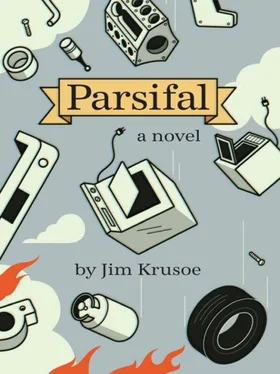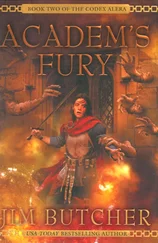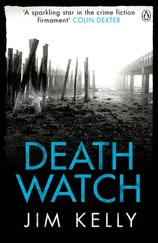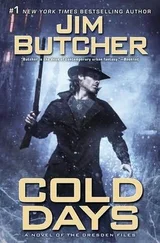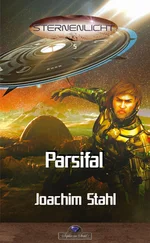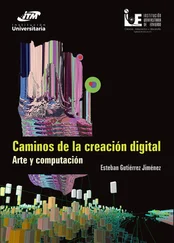Just to be sure, Parsifal asked, “Do you have any tickets to the forest?”
The man named a price.
“I’ll take one.”
“Hey pal, you’ve got yourself a real bargain.”
“Thanks.”
When he first arrived in the city, Parsifal was assigned a public health social worker. She had him take a bath, bought him a new set of clothing made of denim, burned his old clothes, and found him a room at the YMCA. She then enrolled him in the local high school and gave him enough money to live on. When he graduated from high school, which didn’t take long because of the excellent training his parents had given him, it was up to him to find a new place to stay and a job.
The sadness that seeps into my heart.
Sometimes Parsifal wondered how his parents ever met.
“It was at a dance,” his mother once told him, and when he pressed her for details she claimed not to remember. “The only thing I could think about the whole time I was there was your father,” Pearl said.
But what kind of dance could it have been in the middle of the forest?
One afternoon, waiting for a librarian to get off work, Parsifal read about mountain climbing. The book stated that at times a climber can go thirty or forty feet straight up without a problem, and then the climber will hit a ledge that may take half a day to get around.
The book said that climbers climbed because it was there.
“It” being the mountain.
That same afternoon, he found a book about fountain pens. It was then, undistracted by the snores and snuffles of others using the library, that he rekindled his interest in fountain pens, which had begun so many years ago in the forest but until that moment had lain dormant.
The bus driver turned out to be one of the very same men Parsifal had witnessed earlier carrying an overnight bag and striding confidently across the bus terminal. His name, according to the rectangular plastic label made to look like metal on the front of his gray uniform, was Nick. He told Parsifal to take a seat. Then he returned to looking at something on a clipboard and began to rev the engine. His hair was brown and starting to thin.
When the rest of the passengers had arrived and been seated, Nick turned off the bus’s interior lights and told everyone to make themselves comfortable. Then he released the hand brake, and the bus slowly rolled out of the station almost directly into a red light, where it had to wait a while longer. Nick used his time to give the engine some additional revs but, all in all, appeared annoyed, and this delay, as slight as it was, seemed an ill omen to Parsifal as well, though riding as he was on a forged ticket, he didn’t feel he could complain.
And it had been that same public health social worker who had come to his school and called him out of class to tell him the tragic story of his mother. It seemed that Pearl, minutes after waving good-bye to him, crazed and disoriented by a mixture of panic over the fire’s spread and probably feeling grief over the loss of her only son, as well — much as any animal caught in a fire’s path — had apparently taken at least one wrong turn, had become engulfed in flames, herself, and had burst into the backyard of a family that was holding — as if in defiance of the conflagration all around them — a barbeque of their own. And though they attempted to douse her with a hose, the water came sadly much too late. It had taken weeks for the authorities to find him and tell him the news, his social worker, whose name was Mrs. Knightly, said.
It was already late by the time the bus left the station — well past dusk. This meant that Parsifal would be arriving at the forest in the middle of the night, something he had not thought about earlier.
Hansel, indeed.
Is it surprising that a person raised in the forest would be wary of strangers?
Not at all. In Parsifal’s case, most of the strangers he encountered there had been hunters who, strictly speaking, did not have human interaction as their goal, but instead were prone to taking pot shots at him when they spotted him in one part of the forest or another. It wasn’t so much that he resembled a deer — Parsifal knew that — but after a hunter had spent an entire day carrying around his heavy firearm or sitting strapped to some tree, Parsifal could understand how a person would be happy just to have something to shoot at.
Actually, many of them wound up shooting trees as well, and though Parsifal understood “where they were coming from” (a phrase he later learned that described a whole range of aberrant human behavior), such understanding made him less, not more, trusting of people.
Parsifal had never seen a woman hunter.
To be seen or be unseen? To be seen is to endure the acidic gaze of others. To be unseen, to be in the dark, is like having bandages soaked in wet baking soda applied where a person has been burned by something or other as yet uncataloged, but possibly acidic in nature.
And yet, in being seen, one’s existence is somehow confirmed, while being invisible. . well, you know. . The inside of the bus was dark. Parsifal’s seatmate, who had already gotten the place by the window, was an old man, roughly the age Conrad would be if he were still alive, but unlike his father, this man had a huge head, short prickly red hair, a rough stubbly beard, pocked skin, and large inflamed knuckles. After a couple of hours, the stranger turned toward Parsifal and stuck out a hand.
“Where are you headed?” the man asked.
“Only as far as the forest,” was Parsifal’s reply.
The man appeared to give this some thought; then the bus stopped.
Parsifal picked up his backpack and stepped out into the dark, relieved to have come to the end of this particular conversation.
One day, on the occasion of Parsifal’s ninth birthday, when Conrad had come up from the city to celebrate, at the beginning of the meal Pearl announced that she would no longer eat any recognizable part of an animal. “Touching their little legs makes me too sad,” she told her husband and her son. “You eat them yourselves.”
So after that, Parsifal (and Conrad on those few occasions he was around) would be left with a plate of legs, arms, ribs, necks, and even ears, while Pearl ate whatever shapeless and anonymous organ happened to be in front of her at the time. “Don’t tell me what this is from,” she would say. “It would only upset me.”
Then, almost as a premonition of their final separation, the day before the forest fire, Pearl changed her dietary restrictions. “It was a phase,” she told Parsifal, snatching a juicy joint from his plate, “and like all phases it had its uses, but now it’s over and your mother is ready to move on.”
What is this sadness that slithers into my heart?
Parsifal watched the bus pull away. There was no moon, and the red dots of the bus’s taillights grew small until he could follow them no longer. The night air was getting cold, so he reached into his backpack and pulled out the insulated jacket he’d thought to pack. Parsifal looked at his hands and could barely see them.
It was very, very dark.
Overhead Parsifal heard the cries of owls, and behind them the distant whoosh of wind through branches. Old memories came back: branches falling on his head, twisting his ankle on a log that suddenly slipped to one side, the smell of smoke. Far away from the road was a spot of yellow light, and above it, he could barely make out a sign, Motel de la Forêt. Motel of the Forest , he thought to himself.
Parsifal shouldered his backpack and began to walk toward the sign.
The sadness that walks into my heart.
The dark felt good on Parsifal’s face. Suddenly, about thirty feet to his left, he heard a thump. He walked over and saw a fresh scar driven into the earth by what looked to be — it was hard to tell without a moon — a deep-fat turkey fryer. Night attacks were nothing new; for one thing, as long as there was no particular target other than the earth itself, no aiming was required. Still, Parsifal couldn’t remember having heard of turkey fryers ever being used as weapons. Until then, he couldn’t remember them ever being used for anything at all but frying turkeys.
Читать дальше
